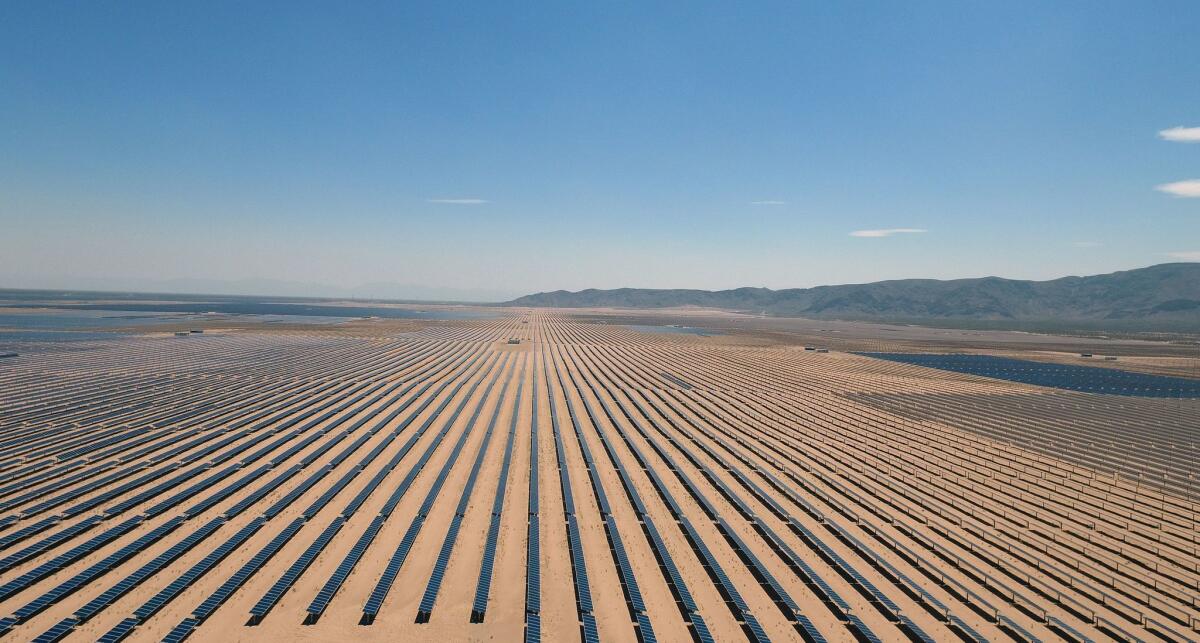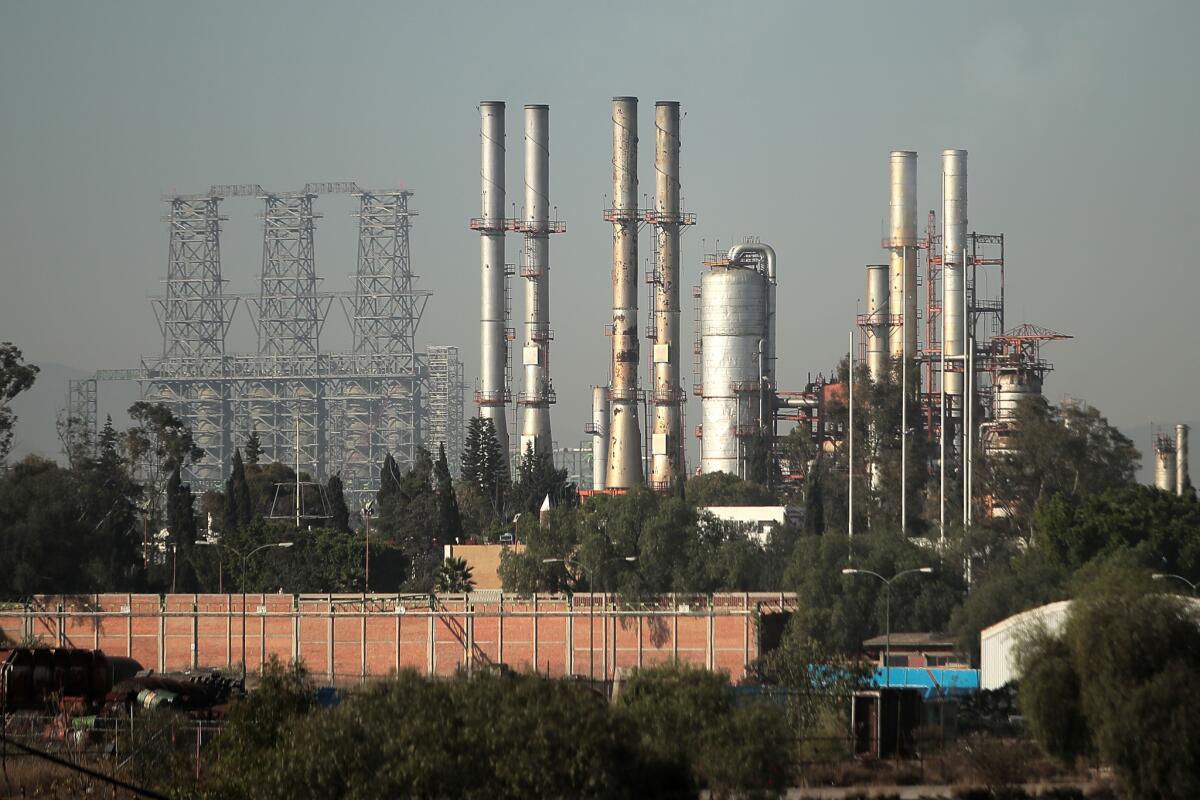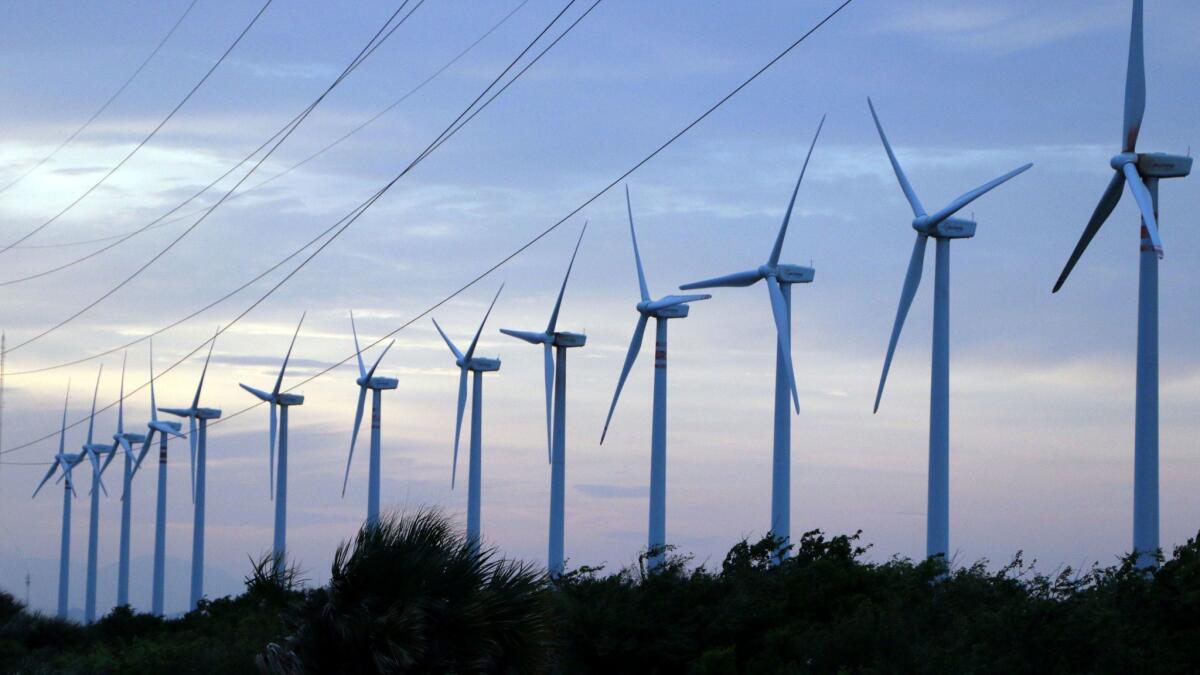Alternative energy efforts in Mexico slow as Lopez Obrador prioritizes oil

- Share via
Reporting from Mexico City — With its windy valleys and wide swaths of desert, Mexico has some of the best natural terrain to produce wind and solar energy. And, in recent years, the country has attracted alternative energy investors from across the globe.
But the market has taken a step back under Mexico’s new president, who has made clear his priority is returning Mexico’s oil company to its former dominance.
Since taking office Dec. 1, President Andres Manuel Lopez Obrador has canceled a highly anticipated electricity auction, as well as two major transmission-line projects that would have transported power generated by renewable energy plants around the country. He has also called for more investment in coal, and stood by as his director of Mexico’s electric utility dismissed wind and solar energy as unreliable and expensive.
It’s too soon to forecast the long-term consequences, but business leaders and energy consultants are seeing a trend: a chilling in the country’s up-and-coming renewable energy market.
“In the past, all anyone talked about was Mexico,” said Lisa Viscidi, director of the Energy, Climate Change & Extractive Industries Program at the Inter-American Dialogue, a Washington-based think tank. “But investors in renewable energy companies have been scared off by Lopez Obrador’s comments. And the cancellation of the electricity auction means the mechanism to enter the market isn’t there. Investors who are not already in Mexico have written it off.”

The oil-first priority reflects the heavily nationalist economic bent of Lopez Obrador, a leftist who was elected in a landslide last year on a platform of empowering the poor and working classes, and getting rid of corruption. When it comes to energy, Lopez Obrador — like President Trump — has embraced a throwback approach that focuses heavily on oil, Mexico’s signature resource, and much less so on alternative energy. To the extent that Lopez Obrador has focused on electricity, it has been about revamping hydroelectric dams under the auspices of the government’s Federal Electricity Commission.
“He believes in oil. He believes in being self-sufficient. And he believes in the state-owned utility being the big monopoly company that used to produce, transport and sell almost all the country’s electricity,” said Luis Alfonso Muñozcano Alvarez, the deputy general director for renewable energy from 2015-18 at Mexico’s Secretariat of Energy.
Energy and oil remain sensitive topics in Mexico, where people still recall the glory days of state-owned oil company Pemex, when it was the country’s economic lifeblood. There’s even a day commemorating Mexico’s 1938 nationalization of its oil and mineral wealth.
In recent years, however, Mexico’s energy market has undergone a transformation and reached out to investors. In 2014, Lopez Obrador’s predecessor, Enrique Peña Nieto, fully opened up the country’s oil, gas and electricity sector to private investment for the first time in 70 years.
The effects were immediate. In the oil sector, companies such as ExxonMobil and Chevron clamored to explore large deposits that had once been the sole purview of Pemex.
On the electricity side, the reform led to billions of dollars in private investment in Mexico’s power sector, both in renewable energy and traditional sources such as natural gas.
Through a series of auctions, Mexico’s state-owned utility awarded long-term power contracts to private developers. Although the auctions were open to all energy technologies, wind and solar companies won the bulk of the contracts because they offered among the lowest prices in the world. Solar developers won contracts to generate electricity in Mexico at around $20 per megawatt-hour, according to the government. Industry sources said that is about half the going price for coal and gas.

The country’s wind generation capacity jumped from 2,360 megawatts at the end of 2014 to 5,382 megawatts this April, according to the Mexican wind energy association. The numbers were even more stark in solar, which soared from 166 megawatts of capacity in 2014 to 2,900 megawatts in April, according to the Mexican solar energy association.
The electricity auctions were also seen as the main vehicle for Mexico to reach its clean energy commitments made as part of the Paris climate accord to produce 35% of its electricity from clean energy sources by 2024, and 50% by 2050. Under Mexico’s definition, clean energy sources include solar and wind generation, as well as sources that some critics say aren’t environmentally friendly — such as hydroelectric dams, nuclear energy and efficient natural gas plants. Currently, 24% of Mexico’s electricity comes from clean energy sources.
Although Lopez Obrador made clear on the campaign trail that he would limit foreign investment in the oil sector, many energy experts hoped he would leave the electricity sector alone. Instead, in March, he canceled the fourth long-term electricity auction, saying he wants to hand back control of the power market to the state-owned utility.
The auction’s cancellation puts in doubt Mexico’s ability to meet its clean energy goals under the Paris accord, according to experts. “If you are talking about the 35% goal by 2024, then it would seem extremely difficult, even by the loose definition of clean capacity,” said James Fowler, a senior energy analyst at ICIS, a price reporting agency.
The only new electricity-generating capacity that Mexico has committed to building since Lopez Obrador took office, Fowler noted, are five new gas-fired plants, which aren’t considered clean energy.
In June, the credit agency Fitch Ratings warned that the recent cancellations of the transmission line projects and the fourth power auction “are likely to increase energy supply risk and price volatility” in Mexico.
“There have been inconsistencies on whether the government supports clean energy over traditional or old fashioned sources such as nuclear stations,” said Rajan Vig, chief consultant for Mexico operations of California-based Western Power Trading Forum, which advocates for electricity interests. “There is an unpredictability about Lopez Obrador’s political party that is common in protectionist Latin American governments, swaying with the tide of populism over logic on occasion. It is therefore hard to gauge whether Mexican renewables is seen as promising a market as it perhaps was deemed under the old government.”
Whatever happens could affect the fortunes of California-based solar companies that have invested in the Mexican market, including Pattern Energy Group and SunPower. Private renewable energy companies say they are in a wait-and-see mode.
“The market hasn’t changed because the rules haven’t changed. What has changed is a series of messages on the part of the new administration,” said Benigno Villarreal, director general of Mexican energy developer Vive Energia.
Clean energy plants will continue to come online for the next couple of years because of prior contracts, Villarreal added. The question is whether more will open three and four years down the road.
Despite the uncertainty, Mexico has one big advantage for investors, and that’s its expanding appetite for energy. Demand here is growing faster than in the United States thanks to population growth and new factories, many financed with U.S. and foreign capital, said Raúl Santos-Coy, head of business development in Mexico for EDPR, a Portugal-based wind energy company. Mexican officials estimate that energy demand in the country will grow around 3% annually for the next 15 years.
Even if the government stops buying renewable energy, he noted, there will remain a private market for big companies.
“Commercial and industrial consumers will look to procure energy from the cheapest possible source,” Santos-Coy said. “And right now, that source is solar and wind energy.”
Green is a special correspondent.
Twitter: @PmcdonnellLAT
More to Read
Sign up for Essential California
The most important California stories and recommendations in your inbox every morning.
You may occasionally receive promotional content from the Los Angeles Times.









